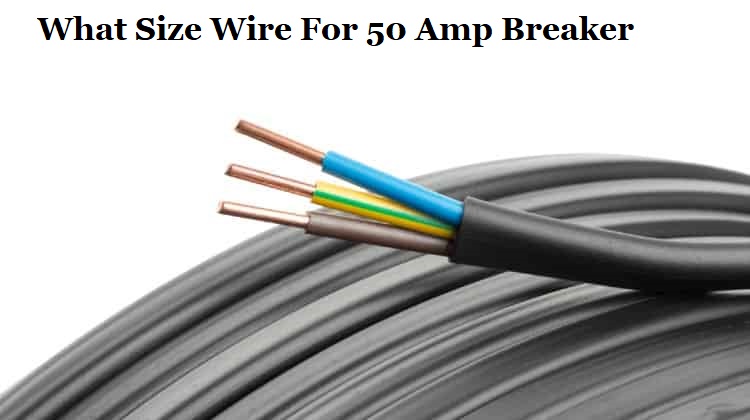What Size Wire For 50 Amp Breaker- A Quick Guide

It is critical to consider the electrical code requirements as well as the unique application when deciding the right size wire for a 50 amp breaker. The wire’s size is defined by the amount of current it can carry without exceeding its ampacity (current-carrying capacity) and risking overheating or other electrical risks.
Also Read:- How To Calculate Electric Bill From Meter Reading In Philippines
The National Electrical Code (NEC) normally advises utilizing a wire gauge of 6 AWG (American Wire Gauge) for copper conductors in the case of a 50 amp breaker. This wire size can securely withstand a maximum current of 50 amps.
It’s important to note that local electrical codes may have special requirements or modifications, so for exact information depending on your specific area and application, check the local codes or a professional electrician. Other criteria that may influence wire size selection include the distance between the breaker and the load, the kind of wiring (e.g., THHN, NM), and voltage drop considerations.
It is suggested that you visit a professional electrician who can assess your individual scenario and provide guidance on the required wire size and installation requirements for a 50 amp breaker.
What is a 50 amp breaker and why do you need one in your home?
50 amp breakers are a necessary tool in home wiring. If you want to use energy-consuming products like hot tubs and air conditioners, 50 amp breakers can deliver the necessary current. Because 50 amps is greater than what is found in most electrical boxes, having 50 amp capability implies you have not met the needs of newer, more powerful equipment.
The 50 amp breaker also requires 50 amp wire – 8 gauge aluminum or 6 gauge copper – to ensure a secure connection between the circuit and the device, regardless of its power requirements. For your home’s safety, performance, and lifespan, I recommend 50amp breakers.
A 50 amp breaker is a device that protects electrical circuits and appliances from overloading or excessive current. It is a type of circuit breaker found in both residential and commercial electrical systems.
A 50 amp breaker in a residence is used to offer a dedicated circuit for high-power appliances or equipment that demand a higher electrical load. Electric stoves, ovens, huge air conditioning units, hot tubs, and other heavy-duty electrical equipment are examples of such appliances.
The 50 amp breaker protects the electrical circuit by preventing it from carrying more current than it is designed to manage. If the current exceeds the breaker’s rating, the circuit is tripped or disconnected, blocking the flow of electricity and preventing potential hazards such as overheating, electrical fires, or equipment damage.
A dedicated 50 amp circuit with a breaker guarantees that high-power appliances or equipment receive the necessary electrical supply without overwhelming the home’s existing wiring or other circuits. This contributes to the integrity of the electrical system, prevents electrical accidents, and assures the efficient and safe operation of the connected devices.
What is the appropriate 50 Amp wire size for a 50-Amp circuit breaker?
The ideal wire size for 50 amps is 4 gauge aluminum or 6 gauge copper. This complies with the American Wire Standard (AWS). The use of thinner wires results in an electrical system that does not fulfill code requirements and can represent a major safety threat.
The American Wire Gauge (AWG) standard categorizes wires with a copper conductor core. Some circuits use aluminum core conductor wiring instead, which necessitates a different 50 amp wire size than would be required if a 50-amp circuit breaker was used.
Wire Size Ampacity chart
We detail what gauge wire you need for the maximum amperage, or strength, of the electrical current in the chart below. It should be noted that the gauge of aluminum and copper wires might sometimes differ. The gauge size for the most widely used copper wires is listed below.
| Maximum Amps | 7 | 10 | 15 | 20 | 30 | 40 | 55 | 70 | 95 |
| Gauge (Wire Size) | 18 | 16 | 14 | 12 | 10 | 8 | 6 | 4 | 2 |
FAQs 50 amp Wire size
Q: What size wire do I need for a 50 amp breaker?
A: For copper conductors, the recommended wire size for a 50 amp breaker is commonly 6 AWG (American Wire Gauge). This wire size can securely withstand a maximum current of 50 amps.
Q: Can I use a smaller wire size for a 50 amp breaker?
A: It is not suggested to utilize wire sizes smaller than those required for a 50 amp breaker. Overheating, greater resistance, and other risks might result from using a wire that is too tiny. To maintain safety and compliance, it is critical to adhere to the electrical code standards and guidelines for wire sizing.
Q: What type of wire should I use for a 50 amp breaker?
A: Depending on the application and local electrical rules, the type of wire suitable for a 50 amp breaker may vary. THHN/THWN (Thermoplastic High Heat-resistant Nylon-coated) or NM (Non-Metallic) cables are common types of wire used in 50 amp circuits. To determine the suitable wire type for your specific installation, consult the local electrical codes or a professional electrician.
Q: Can I use aluminum wire for a 50 amp breaker?
A: Aluminum wire can be used for a 50 amp breaker, however the gauge must be larger than copper wire to provide the same ampacity. To prevent any potential concerns related with aluminum wiring, it is critical to check the electrical code requirements and instructions unique to aluminum wiring, as well as to ensure suitable installation practices.
Q: Can I use a larger wire size for a 50 amp breaker?
A: It is normally OK to use a greater wire size than is suggested for a 50 amp breaker. However, it is critical to ensure that the wire connections and terminals are compatible with the bigger wire diameter and that the electrical system can handle the greater wire diameter.
Final Words
To ensure adequate electrical protection and the general safety of your property, it is critical to install and wire a 50 amp breaker correctly, conforming to electrical rules and guidelines. It is best to consult a certified electrician to examine your individual electrical demands, establish whether a 50 amp breaker is required, and assure appropriate installation and compliance with local electrical standards.










